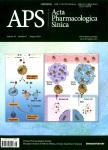Effect of protein kinase C alpha, caspase-3, and survivin on apoptosis of oral cancer cells induced by staurosporine
Effect of protein kinase C alpha, caspase-3, and survivin on apoptosis of oral cancer cells induced by staurosporine~1作者机构:Department of Pathology and Pathophysiology School of Medicine Wuhan University Wuhan China The First Department of Oral and Maxillofacial Surgery School of Stomatology Wuhan University Wuhan China
出 版 物:《Acta Pharmacologica Sinica》 (中国药理学报(英文版))
年 卷 期:2005年第26卷第11期
页 面:1365-1372页
核心收录:
学科分类:1002[医学-临床医学] 100214[医学-肿瘤学] 10[医学]
基 金:Project supported in part by Natural Science Foundation of Hubei Province (№ 304130550)
主 题:protein kinase C alpha caspase-3 survivin protein apoptosis staurosporine carcinoma, squamous cell mouth
摘 要:Aim: To elucidate inhibition of protein kinase C α (PKC α) activity by staurosporine on apoptosis of oral cancer cell line tongue squamous cell carcinoma (TSCCa) cells and to clarify the role of survivin and caspase-3 in mediating apoptosis. Methods: TSCCa cell viability was measured by MTT assay after 100 nmol/L staurosporine treatment. Apoptotic cells were identified by using phase contrast microscopy, acridine orange/ethidium bromide staining, and flow cytometry. Level of PKC α and its subcellular location were investigated using Western blot analysis. Expression of survivin and caspase-3 were evaluated using immunocytochemistry. Results: Staurosporine significantly inhibited the cell viability of TSCCa cells in a dose- and time-dependent manner. Marked cell accumulation in G2/M phase was observed after 100 nmol/L staurosporine exposure for 6 h and 12 h. In addition, the percentage of apoptosis increased in a time-dependent manner, from 2.9% in control cultures to approximately 27.4% at 100 nmol/L staurosporine treatment for 24 h. Staurosporine displayed difference in inhibitory efficacy between cytosolic and membrance-derived PKC α. The content of PKCα in membrane versus cyto-sol decreased quickly, from 0.45 in ethanol-treated control cultures to 0.18 after staurosporine exposure for 24 h (P0.01). After treatment with staurosporine, a time-dependent reduction of survivin and an activation of caspase-3 were observed in TSCCa cells. Conclusion: Staurosporine inhibited cell viability and promoted apoptosis in TSCCa cells. Inhibition of PKCα activity might be a potential mechanism for staurosporine to induce apoptosis in this cell line. The cleavage of survivin and activation of caspase-3 signaling pathway might contribute to PKC α inhibition-induced apoptosis.



